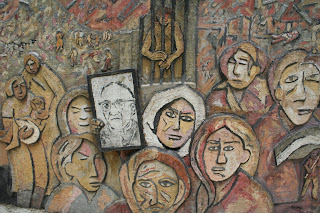
Already we are working on a program for next year. The new schedule is very different from our last trip. This is designed as an introductory experience for any staff member. The idea is to expose participants to a variety of communities that main form the basis of a longer lasting relationship. We also see this experience as an important way to develop leadership capabilities in all participants.
DRAFT PROGRAM FOR 12-DAY COMPADRES/COMADRES EL SALVADOR EXPERIENCE
DAY 1:
Travel to and arrival in El Salvador (via US) with transfer to San Salvador guesthouse and brief introduction/orientation by SalvAide El Salvador Representative
DAY 2:
AM: Workshop with Equipo Maíz on socio-political history of El Salvador
PM: “Contrasts Tour” of San Salvador to witness the geographical distribution of social inequity and exclusion among some of San Salvador’s neighbourhoods
DAY 3:
All day: Seminars at Central American University (UCA – Jesuit University) covering education topics, e.g. liberation theology, critical pedagogy, popular education, the role of the Church in social struggle, the legacy of Archbishop Romero and the Jesuit scholars
DAY 4:
All day: “Archbishop Romero Tour” – a tour officialised by the Government of El Salvador through the Ministry of Tourism in homage to El Salvador’s patron saint, martyred Archbishop Oscar Romero, whose peaceful struggle for human rights in El Salvador during the late 1970s earned him a Nobel Peace Prize nomination. Archbishop Romero is being considered for sainthood under the Church’s official beatification process.
DAY 5:
All day: “Education in El Salvador Tour” – a brief look at the education system in El Salvador as an example of low-middle income country education around the world. The tour includes meeting with Ministry of Education officials to outline their education reform efforts, meeting with the National Association of Salvadoran Educators – 21 June (ANDES 21 de Junio, El Salvador’s teachers union), and visits to various public and private education institutions.
DAY 6:
All day: A visit to the colonial town of Suchitoto in Cuscatlán province for a tour of the historic town, the Joya de Cerén Mayan ruins (a UNESCO World Heritage Site), and for an introduction to the work of SalvAide sister organizations CRIPDES and CORDES in the region.
DAY 7:
All day: A visit to Chalatenango province with a focus on the model town of San José Las Flores (a town repopulated by internal refugees during the civil war) to learn more about the work of CRIPDES and CORDES in the region. The visit will include an interpretive eco-tourism hike to the Our Lady of Resistance statue of the Virgin Mary erected by community members as an emblem of community opposition to large-scale metal mining (much of it Canadian) in the region (with possible short workshop on popular opposition to Canadian mining in El Salvador by the civil society National Roundtable on Metal Mining).
DAY 8:
All day: A visit to San Vicente province and the Lower Lempa River Region (Bajo Lempa) to learn more about the work of CRIPDES and CORDES there and for an eco-tourist boat tour through the Bajo Lempa river estuary, its mangrove forest, and the cooperative cashew orchards on Montecristo Island
DAY 9:
All day: Direct participation in a hands-on social works community education project for which the delegation will have raised funds
DAY 10:
All day: Direct participation in a hands-on social works community education project for which the delegation will have raised funds
DAY 11:
AM: Return to San Salvador guesthouse
PM: Final debrief and preparation for early next day travel
DAY 12:
Travel to and arrival back in Ottawa (via US)
ESTIMATED IN-COUNTRY COST:
Covers food and bottled water (three meals per day), accommodations (shared), private transportation, Spanish-English interpretation, and coordination
$850 per participant (minimum 10 participants)
$1,050 per participant (7 participants)
$1,325 per participant (5 participants)













.jpg)
